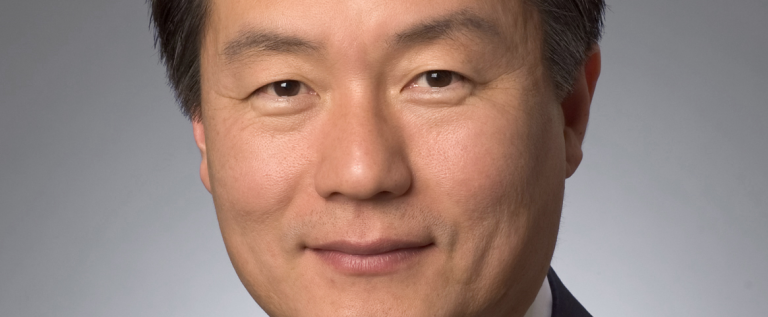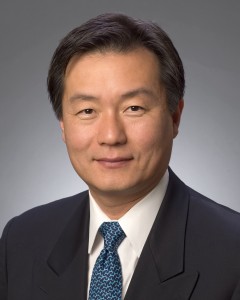Northrop Grumman’s Ike Song awarded NAAAP 100

Original biography by guest contributor, Michelle Bahk
When it comes to the motivation that was instrumental in guiding Ike Song’s future, a singular event in his dad’s teenage life proved to be a defining moment behind Ike’s distinguished 27-year career marked by global milestones. Today Ike is vice president of Situational Awareness Systems, Navigation Systems Division, Northrop Grumman Corporation, world leader in the design, development and manufacture of advanced electronics for military, civil and commercial applications.
Ike’s father was a 17-year-old English major at Korea University when the Korean War broke out. U.S. Marines stationed there went to the university to recruit English majors to become interpreters. Ike’s dad told a visiting colonel that though English was his major, he was not especially conversant. The colonel assured him he would be able to study in the United States at Ohio State University. Unfortunately the colonel was killed in combat, and the dream of a U.S. education died with him. Ike’s dad promised himself that when he had children they would be educated in America. Ike’s father worked in the U.S. embassy in Korea, aiding the Song family’s immigration to the U.S. Ike was eleven years old.
The family overcame financial challenges and eventually bought a small grocery store when Ike was in junior high school. Working alongside his father at the store was Ike’s first foray into management. There he gained more real-world financial aptitude—from working capital, cash flow, operating margin, and inventory to managing employees—than his UCLA MBA or his Harvard business management program provided decades later. Ike’s solid work ethic, drive, and time management skills resulted from the long hours worked at the store after school.
Ike had always been interested in learning how things worked, so studying engineering was a natural fit. While still in Korea, Ike had been inspired by watching the Apollo 11 moon landing in July 1969. The family had no television, however every neighborhood had a corner comic book store where for an entry fee you could read comic books and watch the black and white TV. Seeing astronaut Neil Armstrong walk on the moon is an image Ike still vividly recalls after all these years. With the vision of Neil Armstrong walking the moon imprinted in his mind, Ike worked hard to master the English language and matriculate at M.I.T. He had an immigrant’s drive to succeed.
As his aspirations grew more tangible and great successes followed, he gave back to the community. He emerged from the Asian American community a born leader at a young age. Ike made director at age 36 and went on to execute the role of General Manager of two companies before assuming his current position. In conjunction with his professional successes in leadership, Ike established himself as a forerunner in both the Los Angeles and Asian American communities. Several events in his life shaped his ambitions, leadership skills, and strong sense of duty to his communities.
Upon the announcement of the disappointing Rodney King verdicts, riots ensued on the streets of Los Angeles on April 29, 1992. The media transformed the racial tension into African-American verses Korean American, specifically the small grocery owners in South Central. With tensions between the minority communities at an all time high, Ike’s father set out to establish the African-American Korean-American Church Association (AKCA), an organization devoted to reconciling the fractured relationship of the communities. Ike collaborated with his father to provide bi-directional cultural exchange in the effort to promote understanding and awareness. They were instrumental in procuring scholarships to African American students to expose the next generation to opportunities for success. Racial tensions lessened when students were sent to Korea to learn about Samsung and the Korean culture. Solidarity between the minority communities ensued. Ike’s father fostered a strong appreciation for the African-American community—he acknowledged that it was the African-American community that paved the way for immigrants with respect to equal rights in the United States. This framed Ike’s perspective and enforced his sense of responsibility to pay back to the Los Angeles community.
The success of AKCA equipped Ike to later direct Hope Ministry for Persons with Disability and Young-Nak Outreach Transformation (YNOT). Ike’s leadership skills enabled him to coordinate and manage Hope Ministry with more than 150 members, organize events including quarterly retreats, a winter formal dance for the young adults with disabilities, and monthly family outings. His business management know-how came to play when he formulated the business plan, by-laws, and launched Group Homes for Asian Americans with Disability within the YNOT organization. Hope Ministry serves students of all ages with physical and mental disabilities like autism. Ike leads the organization to support families with disabled children to receive proper benefits.
Both organizations offer practical services to the Asian American community to address specific cultural needs. A common struggle Asian Americans face is shame regarding disabilities that make for difficulty when proactively seeking benefits and support from the government. The organizations Ike supports bring forth sensitive issues to be dealt with at a community level, actively creating a network of support. A particularly meaningful success story was when the Hope Ministry taught an autistic child with no language skills how to articulate his needs. After ten years of hard work, the channels of communications finally opened up and he is now able to express himself and function in a socially acceptable manner. The leadership skills Ike honed in business allowed for the realization of community service at a much larger scale than individual contributions. Ike’s compassionate sensibility to serve others is amplified in Hope Ministry and YNOT.
One of Ike’s most notable recent major accomplishments is his contribution to advancements in Open Architecture, critical to the future of electronic systems products. Essential to national defense, Open Architecture is the ability to integrate individual products to create synchronized, interoperable networks that enhance situational awareness, improve survivability, and increase mission effectiveness across an array of platforms, from rotorcraft and fixed-wing aircraft to unmanned aerial vehicles and ground and mobile systems. Ike is considered a thought-leader for this business eco-system that has created a paradigm shift in providing next generation sensor integration to the war fighter in a most efficient and effective way.
The recipient of three patents, numerous trade secret and merit awards, Ike attributes his inner drive to rising from humble beginnings and being rewarded for his talent and hard work, thanks to his father, who motivated him to reach for the stars. His leadership inspires and influences others to move with him to proactively make positive changes. He is widely acknowledged as a person to follow. Ike sponsors professionals of all backgrounds with the desire to succeed. Ike learned the difference between a “mentor” and a “sponsor” is that a mentor guides and suggests routes of learning, whereas a sponsor tells you what needs to be done while actively pulling you up. He believes in not only mentoring, but also in sponsoring capable and deserving people. Ike’s innate leadership ability and hard earned professional skills coupled with his respect for the people who have led the way before him and his compassion to serve the community make a powerful figure to emulate.
This past weekend, the National Association of Asian American Professionals announced the 2012 honorees of the NAAAP 100 award. Winners were announced during NAAAP’s 30th Anniversary / National Convention in New York City’s Hilton Hotel.
Winners included Doris Ching, Vivienne Poy, Ike Song, Hines Ward, and Richard Lui. The following article appeared originally in ALIST Magazine’s Autumn 2012 issue. Check back tomorrow for features on the other winners.





